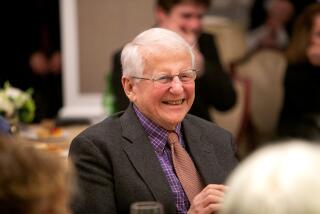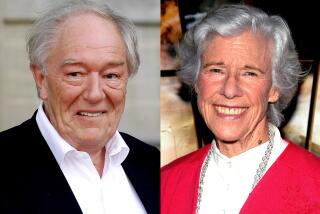Jerzy Grotowski; Seminal Theater Director
Jerzy Grotowski, widely considered the world’s most daring and influential theater director, has died in Pontedera, Italy. He was 65 when he died Thursday after a lengthy battle with leukemia.
“No one since Stanislavsky has investigated the nature of acting, its phenomenon, its meaning, the nature and science of its mental-physical-emotional processes as deeply and completely as Grotowski,” British director Peter Brook once said.
The seminal figure of experimental theater founded a workshop he called Laboratory Theatre in his native Poland in 1959. The keystone of his philosophy was “poor theater,” the idea that theater should be viewed as secular ritual, stripped bare of lights, music, props and other artificial trappings.
Grotowski believed the only essential element was the actor, who needed only his body and his voice to convey inner truths. His best actors exhibited extraordinary control over their voice and movements, groaning with symphonic power and gliding with the grace of fine dancers.
But many observers, even other directors, often responded to Grotowski’s work with bafflement and derision, some accusing him of anarchic self-indulgence. He never advertised his productions and allowed no more than 100 in the audience. He barred latecomers, often leaving frustrated ticket-holders banging on the doors.
“He had no desire to be famous or held up as a guru,” said professor Robert Cohen, who admired Grotowski and brought him to UC Irvine to teach in the 1980s. “He considered [his work] more research than art. He was a researcher into the prehistory of human performance.”
Grotowski, whose work was discussed at length in the 1981 sleeper hit movie “My Dinner With Andre,” would agree that he was not the least bit interested in commercial success.
He stopped directing plays in the 1970s and spent much of the 1980s in the United States, teaching at Columbia University and UC Irvine. In 1991 he was awarded a MacArthur Foundation grant of $340,000.
In the last decades of his life, he shunned public performances, retreating with a core of disciples to Pontedera, where they explored the relationship between theater and ancient rituals, such as African voodoo and Gregorian chant. Mystery shrouded his center in Italy, which Grotowski said was not an acting school and did not produce research that could be directly applied to work in the theater.
During a lecture in 1991 at UC Irvine, Grotowski said: “I’ve never looked for a big public, which is why I’ve always worked in towns and small cities. My first problem wasn’t limiting spectators but getting them at all. Sometimes I was the only one there, and those were among the best performances.”
Grotowski was born in Rzeszow, Poland, on Aug. 11, 1933. His father, Marion, was a forester and a sculptor and his mother, Emilia, was a teacher. When he was 16, he developed a kidney ailment that nearly killed him. He emerged from a year in the hospital with a much more solemn outlook.
He decided to become a theater director when he finished high school, studying first at the State School of Theatre Arts in Krakow and then at Moscow’s Central Institute of Theatre Arts. In Moscow he learned all he could about the great Russian director Konstantin Stanislavsky. He wanted to be seen as nothing more than a great student of Stanislavsky, Cohen said.
Like Stanislavsky, Grotowski required enormous discipline of his actors. He was famous for subjecting actors to physically and mentally grueling exercises in which they maintained contorted positions, sometimes for hours at a time. Grotowski believed that certain body positions helped actors discover untapped vocal potential, or “resonances.”
His work dwelt on difficult themes, often involving cruelty and torture. “The Constant Prince,” one in a repertory of plays he brought to New York in 1969, was one of his best-known works. Based on a 17th century Spanish play, it centers on a Christian prince imprisoned by Islamic North Africans who subject him to torture so severe that the prince ultimately chooses martyrdom over life in chains. In Grotowski’s version, the Islamic masters are turned into Stalinist oppressors dressed in the robes of Polish judges. In the original 1965 production in Wroclaw, Poland, the actors performed in a wooden pit surrounded by the audience, who peered down on them like observers at a Roman circus.
In a rare public lecture at Irvine in 1991, Grotowski tried to explain the motives behind his life’s work.
“The true art is profoundly rebellious. The true art is not an obedient dog,” he said. “It’s not by accident that the great artists were not in agreement not only with the establishment but also with society. The true function of art is to equilibrate what is out of equilibrium.”
According to Grotowski’s wishes, there will be no funeral. His body will be cremated and his ashes dispersed in India.
More to Read
The biggest entertainment stories
Get our big stories about Hollywood, film, television, music, arts, culture and more right in your inbox as soon as they publish.
You may occasionally receive promotional content from the Los Angeles Times.











